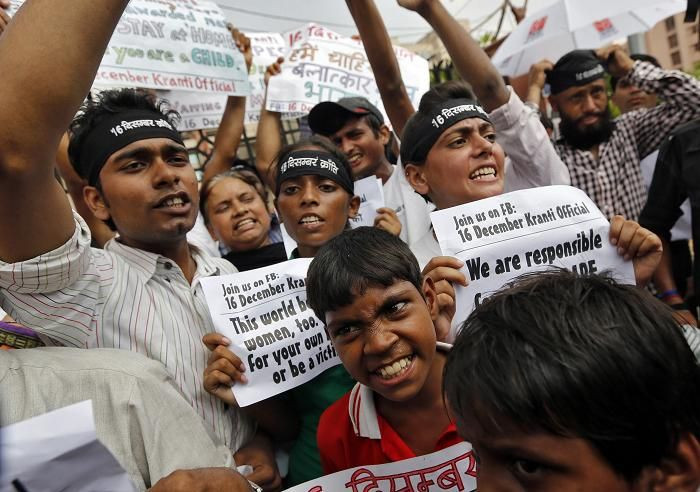Delhi Gang-Rapists Sentenced To Death: India’s Conflicting Attitudes Towards Capital Punishment

A court in India has sentenced four young men to death by hanging for participating in the gang-rape and murder of a young female student in Delhi who subsequently died from her injuries. The 23-year-old woman was assaulted on a bus in December and expired two weeks later in a hospital in Singapore. The incident sparked outrage and protests all across India and forced the country to boldly confront its long and grim history of abusing girls and women.
Mukesh Singh, Vinay Sharma, Akshay Thakur and Pawan Gupta have denied the charges and their lawyers are expected to file an appeal with the Supreme Court (a process that could take many years). In rejecting calls for a more lenient sentence, Judge Yogesh Khanna said the case "shocked the collective conscience" of the country and that "courts cannot turn a blind eye" to such violent crimes. "This case definitely falls in the rarest of rare categories and warrants the exemplary punishment of death," Khanna stated.
Indeed, given the mood of the country, as well as demonstrators outside the court who demanded a death penalty, Judge Khanna had little other choice but to impose the maximum punishment. In March of this year, the government imposed harsh new laws, including the death penalty, for the most serious cases of rape.
India has the death penalty on its books, but it is rarely ever applied. Reuters reported that judges in India hand out on average about 130 death sentences annually, but only three people have been hanged in the past 17 years (two of those were convicted of terrorism). Over that period, no rapist has been executed, not even when his victim had died. Yet, adding to this paradoxical scenario, last year India opposed a draft resolution from the United Nation to call for a global moratorium on capital punishment.
Meanwhile, human rights groups and anti-death penalty advocates in India – who have long called for better protection for women – nonetheless criticized the judge’s decision in this high profile case. They cite that India has to make some drastic changes in its very culture in order to create a safer climate for the fairer sex. “The punishment of perpetrators is important but… working together as a society to keep women safe is much, much more important," Meenakshi Ganguly, the South Asia director of Human Rights Watch, told BBC. Aruna Kashyap, a lawyer and womens rights advocate affiliated with HRW, tweeted: If India is serious about making sure the law catches up [with] every rapist, it [should] introduce a victim & witness protection program.”
Amnesty International took an equally strident tone in its opposition of the death sentence. “Our deepest sympathy goes out to the victim’s family. Those responsible must be punished, but the death penalty is never the answer,” said Tara Rao, Director of Amnesty International India. “Sending these four men to the gallows will accomplish nothing except short-term revenge. While the widespread anger over this case is understandable, authorities must avoid using the death penalty as a ‘quick-fix’ solution. There is no evidence that the death penalty is a particular deterrent to crime, and its use will not eradicate violence against women in India.”
Amnesty proposed that instead of killing convicts, Indian courts and government should undertake “far-reaching procedural and institutional reform, and not the death penalty” in order to “tackle the endemic problem of violence against women in India” and to respond “effectively at all levels to reports of rape and other forms of sexual violence.” Amnesty asserted that it opposes the death penalty in all cases without exception, regardless of the nature or circumstances of the crime.
According to Indian media, the public (and judges) are divided over the efficacy and morality of the death penalty. Between 2001 and 2011, courts sentenced 1,455 prisoners to death, according to the National Crime Records Bureau – but many of these inmates have had their sentences commuted to life imprisonment. As a result, India now only has 477 people on death row.
In the United States, since 1976 all executions since have been for murder or conspiracy to commit murder, according to antideathpenalty.org. But in the state of Louisiana, a rapist could conceivably be sentenced to death for raping someone under the age of 13. Dr. Jeanne Zaino, Professor, Political Science at Iona College in New Rochelle, N.Y. told International Business Times that in 1977, the year after the death penalty was reinstated in the U.S., the Supreme Court heard a case regarding the lawfulness of putting someone to death for the rape of an adult.
“The court ruled in that case it was unconstitutional or what amounted to cruel and unusual punishment,” she said. “Almost thirty years later they considered whether someone convicted of raping a child can be put to death -- and once again the Supreme Court held it was unconstitutional. Their reasoning is varied but in essence they have held that the death penalty should be reserved primarily for cases in which the victim is killed – to allow the states to apply it in other cases (as Louisiana and other states have tried to do in the case of child rape, for instance), they found to be instances in which the crime does not warrant the penalty.”
Interestingly, the number of people executed in the US has been falling in recent years, from 98 in 1999, to 37 in 2008; 46 in 2010, and 43 executions in each if 2011 and 2012.
© Copyright IBTimes 2024. All rights reserved.





















